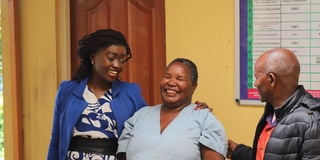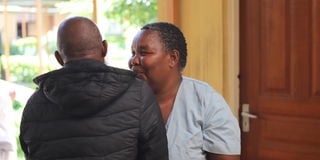Tanzanian woman admitted at PGH since Kibaki was President reunites with family

(From Left) Caroline Ojwang, Selina Paulo and Selina's younger brother Phillipo Paulo as the family get reunited at PGH on August 25,2025.
The Paulo family could hardly contain their joy as they embraced their long-lost sister, Selina Paulo, at Nakuru County and Teaching Referral Hospital (PGH).
Relief, laughter, and disbelief marked the emotional reunion that came after 17 painful years of searching and waiting.
“All along, we thought she had died and had long lost hope of ever finding her,” says her brother, Phillipo Paulo.
For this family, the search for Selina was long and painful.
“Whenever there was a burial for someone with mental illness, we would always go and check if it was our sister,” Philipo narrates.
He shares how Selina ended up in Kenya remains a mystery to them because she went missing in 2005 when the late Mwai Kibaki was President.
At the time, she was in the company of her infant son.
“We are very grateful to the hospital management and everyone who took care of my sister all these years, and for the effort put into reuniting us. She is healthy, as I can see,” Phillipo adds.
He also expressed gratitude for the care given to his nephew. Noting that he is thankful the boy was cared for at a children’s home and put through school.

Selina Paulo and her younger brother Phillipo Paulo share a light moment at the Nakuru County and Teaching Referral Hospital on August 25,2025.
“Once my nephew clears his Form Four exams, we will return to Kenya to help him get the documents he needs to travel home and finally meet his family members, whom he has never had a chance to see,” a jubilant Philipo adds.
At the facility, Selina herself could not hide her joy at seeing familiar faces from home. Beaming with excitement, she kept repeating: “Nimefurahi sana kuenda nyumbani,” her Swahili carrying the unmistakable Tanzanian accent despite her 17 years in Kenya.
For over a decade, however, Selina, 53 was known only as “Rosa TZ” within the hospital walls.
How did she end up at PGH?
According to Caroline Ojwang', a medical social worker and counselling psychologist at PGH, who has walked closely with Selina since March 2008, Selina came to the facility as a referral after being found loitering with a six-month-old baby strapped to her back.
“She was clearly unwell and diagnosed with schizophrenia. The child, a boy, was placed in a children’s home where he has grown up. He is now in Form Four,” Caroline says.
Caroline notes from the onset, Selina, then known as Rosa, gave only fragments of her identity. She mentioned she was Tanzanian and called herself Rosa, but she could not recall more.
Her Swahili accent pointed to foreign roots, and staff began calling her Rosa TZ.
For years, doctors, nurses, and social workers tried to piece together her story. But her mental illness clouded the details, often leaving them with contradictions.
“Sometimes she would give us bits of information, then forget or contradict herself. It wasn’t enough to trace her family,” Caroline recalls.
However, that changed this year when Selina began consistently mentioning her home village in Mbulu, Tanzania, and names of family members. With this lead, the hospital team reached out to church leaders in Tanzania.
Caroline adds that it was a Catholic bishop in Selina’s hometown who recognized the details, cross-checked them with church records, and eventually connected the hospital to her relatives.
“When we called the relatives two weeks ago they could not believe what we were saying. However, after they saw her photo, they confirmed she was theirs,” Caroline says with a smile.
Caroline notes the reunion was deeply emotional not only for Selina’s siblings but also for her son, who grew up in a children’s home and spent years visiting his mother at the hospital.
“Often, he found her unwell and would leave in tears, worried about her future and his own. Now, with his mother’s family traced, he finally has a sense of identity and belonging,” Caroline explains.
Reflecting on the case, Caroline says it highlights the plight of many mental health patients who lose their identities in the fog of illness, often becoming long-term hospital residents.
“For me, this journey has been tough but rewarding. Both mother and son lived in institutions for years. They deserved a normal family life. Now, at least, there is hope that Selina can reconnect with her roots and her son can find belonging,” she says.
“After 17 years of being called Rosa TZ, she now has her real name, her family, and her story back. We hope this becomes the story of other patients in the facility whose families are yet to be found,” she concludes.
